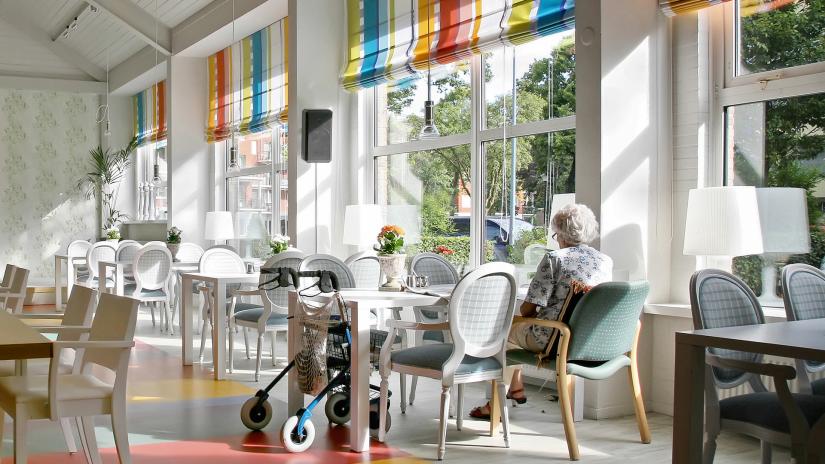The UTS Ageing Research Collaborative is designing a novel tool to support better aged care decision making for people, service providers and policymakers.

Australia's aged care system is fragmented, difficult to navigate and littered with traumatic transition points for people on ageing journeys. It also represents an increasing fiscal challenge for governments and taxpayers and a growing financial burden for future generations.
Creating better, more financially sustainable aged care outcomes is a major challenge. In response, a team at the UTS Ageing Research Collaborative (UARC) is designing a novel tool to support better aged care decision making for people, service providers and policymakers.
“What we’re trying to do is create a multidimensional model that will help users map their way through different scenarios related to ageing in Australia,” says Professor Parker, a co-founder of UARC and one of Australia’s leading research experts in palliative aged care nursing.
“The goal is to help users visualise the interdependencies of Australia’s aged care system to make more informed decisions about the future.”
Modelling the future of aged care services
UARC is a transdisciplinary research group and the first research collaborative within the Institute for Innovative Solutions for Wellbeing and Health (UTS INSIGHT). Researchers from eight UTS disciplines are working together to design the tool, which will be accessible via an interactive digital platform.
It will focus on three ‘planes’ of the aged care system: ageing processes and stages, legal and regulatory systems and requirements, and care and health systems and services. As well as helping users explore the aged care system as it is today, the tool will take an ‘if … then’ approach to modelling future scenarios that can help drive more informed decision making for four discrete user groups.
“First is people who need to make decisions about the pathways, services and entitlements available to them as they age. What are the choices they’re going to make, what are the consequences of those choices, and where do the friction points sit?” says Professor David Brown, a UARC co-founder who leads the UTS Business School’s contribution to the work.
“The next is the business side. How can service providers build seamless transitions for people as their needs change and service delivery within and between organisations needs to adapt? Moreover, how do service providers build partnerships that support quality of care and sustainable organisations?
“The third aspect is at a policy level. When governments make policy decisions for the aged care sector, they need to know what the implications of those decisions are going to be for individuals and provider organisations.
“The final user group is researchers.
This model has the potential to become a significant research resource.
Professor David Brown

Not a health care challenge but a human one
While ageing is often viewed as a health care challenge, UARC researchers — who span the faculties of health; business; law; engineering and IT; design, architecture and building; and transdisciplinary innovation — see it as something that touches every aspect of contemporary life.
As such, the model seeks to capture the diversity of the human experience, as well as the breadth of expertise required to rethink the existing system.
“It’s really important to reflect the diversity of people’s ageing experiences in our work,” says Professor Nola Ries, a researcher from the Faculty of Law who specialises in law, health and ageing.
“That really calls for transdisciplinary approaches to working with older people themselves, their support networks and the providers who deliver different kinds of care and supports to older people.
“It also matters in the context of understanding the broader legal and social frameworks we need to put in place to improve the future of ageing in Australia and the experiences and outcomes for people on ageing journeys.”
UARC is well positioned to deliver this diversity: health researchers bring clinical expertise in aged care and are collaborating with the business team on service blueprinting activities; the business team is also leading financial modelling work that will reveal the cost of different ageing scenarios to individuals, service providers and governments. Legal experts, led by Professor Ries, are mapping the complex legal landscape for consumers and providers.
Further, design and transdiscplinary innovation experts are working together to design the user experience and the model’s digital platform, while an engineering and IT team is conducting analysis and linkage activities using the large datasets that sit at the model’s foundation. All the researchers are working together to develop the archetypes and user journeys that will shape how the model is used.
The team is also consulting broadly across the aged care sector, including with service users and their support networks, creating new opportunities for information exchange among people from vastly different life and professional spheres.
The vision for UARC is to enable socially, economically and environmentally sustainable aged care and support for older people in Australia.
This project aims to transform and significantly improve the ageing experience of older Australians, help shape service delivery to be fit for purpose, and inform good public policy for the future.
Professor Deborah Parker
A prototype of the model is expected to be available in late 2024.
Research team
- Professor Deborah Parker
- Associate Professor Deb Debono
- Dr Serra Ivynian
- Professor Mike Woods (Faculty of Health)
- Professor David Brown
- Associate Prof Nicole Sutton
- Dr Celina McEwen (UTS Business School)
- Professor Nola Ries
- Dr Teresa Somes
- Ms Eugenia Tsihlis (Faculty of Law)
- Associate Professor Phillippa Carnemolla
- Associate Professor Jacquie Lorber-Kasunic
- Professor Cameron Tonkinwise (Faculty of Design, Architecture and Building)
- Distinguished Professor Tuan Van Nguyen (Faculty of Engineering and IT)
- Associate Professor Fanny Salignac (Transdisciplinary School)

